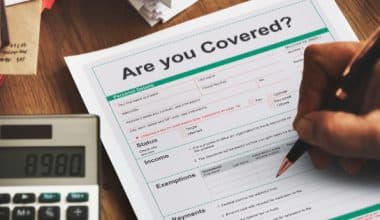A business insurance quote is an estimate of what an insurance company will charge you for a specific type of insurance policy.
Business insurance covers your business from unexpected losses e.g. if your equipment is stolen or you make a mistake and your clients decide to sue. As a business owner, self-employed consultant, or freelancer, you need to factor in certain risks in your day-to-day work. Depending on your profession you may need public liability insurance, professional indemnity insurance, contents insurance, or other types of cover.
Business insurance is designed to protect you from the risks associated with running a business. It’s a catch-all term to describe a range of covers that protect your business from the risks it faces.
Whether you’re a sole trader, running a partnership, or a limited company, you’ll want to think about your business’s set of risks, and whether you want to cover them.
Top business insurance policies
General liability insurance
General liability insurance covers common business risks like customer injury, customer property damage, and advertising injury. It protects your small business from the high costs of lawsuits and helps you qualify for leases and contracts.
This business liability insurance coverage pays for legal costs if a customer trips and suffers an injury at your business, or if you accidentally damage someone’s property. This policy also covers personal and advertising injuries, such as libel and copyright infringement.
Cyber insurance
Cyber liability insurance, also called cybersecurity insurance, protects small businesses from the high costs of a data breach or malicious software attack. It covers expenses such as customer notification, credit monitoring, legal fees, and fines.
A cyberattack isn’t just an inconvenience – it can put you out of business. Cyber insurance coverage helps your business recover from financial losses caused by cyberattacks and data breaches. It can pay for credit monitoring, attorney’s fees, fines, and other costly expenses.
Commercial property insurance
Also referred to as business hazard insurance, commercial property insurance pays to repair or replace stolen, lost, or damaged business property. It covers your business’s physical location and other assets like equipment.
Commercial property insurance protects against the risks of owning or renting an office, storefront, or other business property. It covers property losses when a fire damages your office, or a pipe bursts and floods your store.
Errors and omissions insurance
If you provide professional advice or services to clients, you likely need this policy.
Errors and omissions insurance (E&O) helps cover the cost of a lawsuit if a client claims your work was inaccurate, late, or never delivered. It’s sometimes called professional liability insurance. Your clients might require errors and omissions insurance in the terms of a contract. And it’s strongly recommended for professionals who make a living off their expertise.
This policy will cover legal defense costs related to the lawsuit, including court costs, settlements, and judgments. You’ll typically pay a deductible, and your insurance provider will pay legal expenses up to your coverage limit.
Commercial auto insurance
If your company owns a car, you will very likely need commercial auto insurance. It covers legal bills, medical expenses, and property damage if a business vehicle is involved in an accident.
You can rely on commercial auto insurance for financial protection if you or an employee needs medical care or faces legal expenses due to an automobile accident. If you don’t carry commercial vehicle insurance, your business will be responsible for any medical bills and legal fees, which can get expensive.
Business owner’s policy
If you own or rent a workspace, you likely need a business owner’s policy (BOP).
A business owner’s policy (BOP) bundles general liability insurance with commercial property insurance. It typically costs less than if the policies were bought separately. Most small businesses need general liability insurance and commercial property insurance when they rent or own an office or other commercial space. On top of that, client contracts often require general liability coverage.
Even when coverage isn’t required, a BOP is a wise choice for small businesses that work directly with the public and own valuable business property. This policy protects against financial losses from customer accidents and incidents like fires and burglaries.
Workers’ compensation insurance
Workers’ compensation insurance covers medical costs and lost wages for work-related injuries and illnesses. This policy is required in almost every state for businesses that have employees. It covers costs related to workplace injuries and illnesses, which can escalate quickly due to the high cost of medical care.
While workers’ comp laws vary by state, small businesses typically need a policy in place as soon as they hire their first employee (or a certain number of workers). Even when not required by law, this policy provides important protection against healthcare expenses and employee lawsuits related to workplace injuries, such as a slip and fall in the office, an injury from tools or machinery, or an occupational illness.
You can also rely on workers’ comp if you or an employee needs medical treatment or time off due to a workplace injury – or if an injured employee sues you for failing to prevent an accident.
If you don’t carry workers’ comp insurance, your business will be responsible for any medical bills and legal fees. And most states levy costly penalties for noncompliance.
Professional liability insurance
Even the most experienced and thorough professional service provider makes mistakes. Unfortunately, clients may not be so understanding if your error costs them considerable time or revenue.
Professional liability insurance, also called errors and omissions insurance, protects small businesses against the costs of client lawsuits over unsatisfactory work. It is designed for businesses that make a living off their expertise and helps protect you from lawsuits filed by unsatisfied clients.
Commercial umbrella insurance
Business owners who purchase commercial umbrella insurance usually need it to fulfill a contract that requests higher than standard policy limits. Once a policy’s limit is reached, commercial umbrella insurance provides additional coverage for liability claims made on general liability, commercial auto, or employer’s liability insurance.
Commercial umbrella insurance offers extra liability coverage for the most expensive lawsuits. For example, if a covered lawsuit maxes out your general liability insurance policy but you still owe money for damages, business umbrella coverage can provide additional funds to make up the difference.
Umbrella liability insurance can supplement your coverage provided by:
- General liability insurance
- Employer’s liability insurance (often included in workers’ compensation)
- Commercial auto insurance or hired and non-owned auto (HNOA) insurance
Commercial umbrella insurance can boost coverage for any (or all) of these policies in $1 million increments. Before you can purchase umbrella liability insurance, however, an insurer will require you to carry a certain amount of coverage for the underlying policy.
How to get a business insurance quote
Insurance agents are licensed professionals who shop for insurance on your behalf. They should be able to tell you what kinds of coverage you need, get quotes for you and help you compare options.
Some agents work with just one insurance company and can’t sell policies from any other company. On the other hand, there are also independent agents who can sell policies from many companies. You’ll explain what your business does; they’ll figure out what policies you need and get quotes from a few carriers. Then, you can work with them to pick the right policy for you.
Insurance brokers and agents typically receive payment on commission, so it’s essential to find someone you trust.
However, if you already know that you want to work with a specific company or need a particular policy, it may be easier to get quotes from companies directly. You’ll have to input your data repeatedly to get quotes from each provider. But for most businesses, this process should take only a few minutes.
What information do I need for a business insurance quote?
Getting business insurance is as complex as everything else associated with running a business. Because so many factors determine your insurance needs, risks, coverages, and costs, insurance companies need a lot of information before they can provide your policy.
Before you apply, let’s go over what you will need so the process will be as smooth and efficient as possible.
Business operations information
To get an accurate quote on your business insurance, your agent or carrier will need to have a good understanding of your business operations. Depending on your industry, you will be asked a variety of questions.
If you don’t know the answers right away, that’s OK. However, it is always best to go into the application process with a good understanding of your operations so you don’t have to seek answers and extend the process. Being as specific as you can will ensure that your agent knows exactly which insurance companies are willing to provide quotes based on operational exposures alone.
Ownership and experience information
In addition to questions about your business operations, you will need to answer questions about yourself, specifically regarding years in business and years of experience. The carrier wants to know about the owners and sometimes the employees to better analyze risks and determine your quote.
The better your resume, the better the chances of getting a lower quote.
Contracts
If you use any contracts with clients, you’ll likely be asked to provide a sample of one for the insurance company to review so they can make sure you have the proper controls built into your contract to protect your business against potential claims or lawsuits.
If you don’t have a contract, but provide any type of professional or other services, you may be asked to get a contract written before you can obtain a quote.
Financial data
Your insurance agent or carrier will ask about your business’ estimated annual revenues, payroll, subcontracted costs, business property, and inventory levels. So, be prepared to provide numbers.
Keep in mind that these figures are based on your policy term, which may or may not coincide with your fiscal period.
You don’t need to provide any proprietary reports, but you do want to give your best estimate of these numbers based on the policy term. This is because your policy may be audited at the end of the policy term and you could be penalized if your projection was incorrect.
Copies of current policies
While not necessary to quote, having copies of your existing policies can help the insurance agent review what you have and identify any areas where you may have gaps in coverage. And let’s be honest, a lot happens in a year. Reviewing your existing policies may trigger a reminder to add or remove equipment, vehicles, etc.
Claims history
You will need to provide copies of your “loss runs”. This is a fancy insurance term for a report that shows any insurance claims that have been filed for your business. Most insurance companies will want to see a minimum of 3 to 5 years of claims history from all of your policies.
The insurance agent you are working with can help you draft a letter to request these reports from your existing insurance agent. However, you should know that this step can delay the quoting process significantly if you are unable to get the reports.
Applications
Even after providing all of the items outlined above, you may be asked to complete an application. Thankfully though, much of what you’ve already provided can be filled in ahead of time, leaving you with only a few unique operational questions and industry-specific questions left to answer.
How long does it take to get business insurance quotes?
The method you use to find insurance will determine how long it takes to receive quotes:
- If you’re calling insurers yourself, it might take a week or more to contact all the companies and to hear back from them
- If you’re using an independent agent, it could take anywhere from an hour to a day, or more, to receive quotes
How do you compare business insurance quotes?
Coverage
Most business insurance policies use standard forms, making them pretty similar. But be mindful of some differences. For instance:
- Commercial property insurance and business owner’s policies often include business interruption insurance, but not always.
- Business interruption insurance, in turn, might include extra expense coverage, but it doesn’t always.
If you’re seeking coverage for a specific risk, ask the insurance company directly. You may benefit from working with an independent agent who knows the details of policies from many insurance companies and can help you choose the right one.
Insurer reputation and reviews
You’ll want to consider the performance of the insurer itself as well. Here are some places to look when comparing business insurance companies:
- J.D. Power surveys small businesses annually about their experience with major insurance companies.
- The National Association of Insurance Commissioners offers information about how many people have complained to state regulators about an insurer.
- Firms like AM Best and Standard & Poor’s rate insurance companies on their stability and predicted ability to pay claims.
Total costs
It’s easy to tell which of your insurance quotes offers the lowest premiums. But make sure you also consider:
- Discounts: Some insurance companies offer discounts for purchasing multiple policies or paying your premiums annually instead of monthly.
- Deductibles. A policy’s deductible is the amount you’ll have to pay out of pocket before coverage kicks in. So a policy with a low premium but high deductible might be more expensive in the long run.
- Coverage limits. This is the maximum amount the insurance company will pay for a particular type of loss during the policy period. Lower limits usually mean lower premiums, but they may mean you end up paying more overall.
Other strategies that you can use to get the best price include:
- Confirm that the quotes you are comparing are for the same kind of insurance
- Study the quotes carefully. Double-check the losses covered, the amount of coverage (limits), and the deductibles
- Review coverage exclusions (risks that aren’t covered)
- Check to see if any of your policies can be bundled together. For example, a business owner’s policy will typically combine both general liability and commercial property insurance for a lower cost than if you purchased each policy separately
- Once you’re certain that you’re comparing equivalent policies, look at each company’s premium, but don’t base your decision solely on price. Consider each company’s reputation for quality service, as well as financial stability. You can find this information by searching for each insurer’s financial ratings on the internet
Do I need business insurance?
The type of business insurance quote you need depends on many factors e.g. the activities your company undertakes, any previous claims, the size of your company and if you aren’t working alone you may need employer liability insurance. It doesn’t matter if you work from home, in a busy office, sell products online, or offer your services face-to-face, there are risks associated with every type of business. Mistakes can happen, equipment might get damaged and clients can accuse you of negligence.
Small businesses often aren’t prepared for large, unexpected expenses due to a claim, so it’s important to have the right insurance in place. If you’re self-employed and something goes wrong, you’ll be the one responsible for footing the bill.
Difference between business insurance quote and premium
A quote is different from an insurance premium.
A quote is a preliminary indication of what an insurer might charge you, based on your application. The premium is the amount you end up paying for a policy, which could be higher or lower than your quote.
Recommended Articles
- Business Insurance For LLC: What It Is & Best Options
- Business Interruption Insurance: What Does It Mean & Cover?
- Business Insurance for Consultants: What It Is & How Much It Costs






